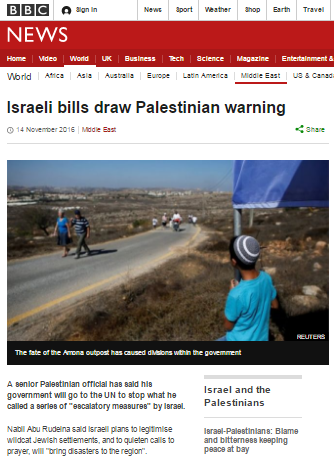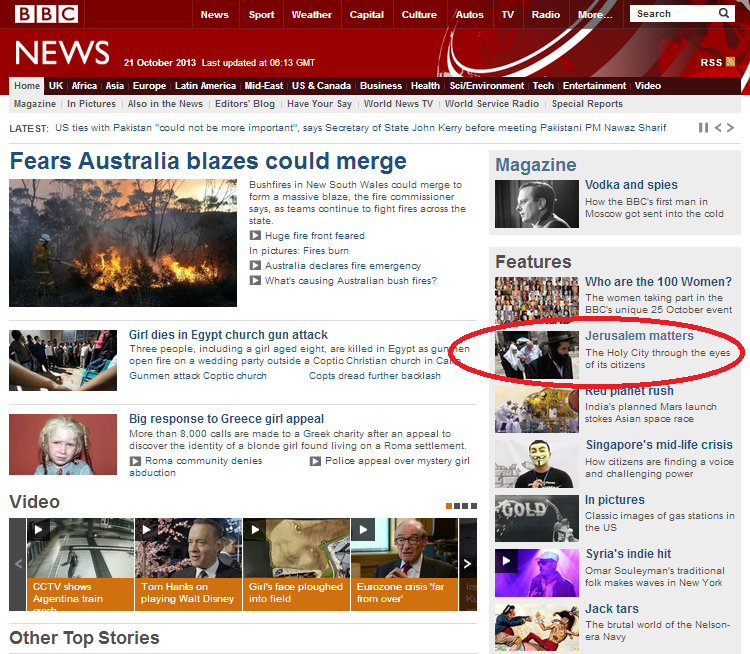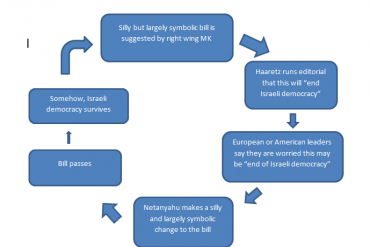As noted in part one of this post, less than 24 hours after the publication of a superficial article concerning the first stage approval of a bill proposed by members of the Knesset aimed at reducing noise pollution from PA systems used by religious establishments, the BBC News website replaced that report with one headlined “Israeli bills draw Palestinian warning“.
The article’s main purpose appears to be amplification of Palestinian Authority officials’ statements concerning proposed legislation under early stage discussion in a neighbouring sovereign state’s parliament.
“A senior Palestinian official has said his government will go to the UN to stop what he called a series of “escalatory measures” by Israel.
Nabil Abu Rudeina said Israeli plans to […] quieten calls to prayer, will “bring disasters to the region”.
On Sunday ministers backed two bills […]
The other bill would mainly impact on Muslims’ call to prayer from mosques. […]
The Palestinian Minister of Waqf and Religious Affairs, Youssef Ideiss, said the plan threatened a “religious war”, the Jerusalem Post newspaper reported.”
The topic of hyperbolic PA officials seeking to intervene in internal legislation in a country in which they have no authority does not come under discussion in this BBC report. Neither does the fact that the PA is not on record as having described the proposal or introduction of similar measures to reduce noise disturbance from mosque loudspeakers in Western or Muslim countries (including neighbouring Jordan) as ‘bringing disaster’ or ‘threatening religious war’.
Instead the BBC elects to provide backwind for the latest opportunistic PA agitprop, presenting a portrayal of the proposed law on PA systems which is even more superficial than the one in its previous report and similarly naming only the Israeli prime minister despite the fact that the bill was submitted by other MKs.
“While the volume limitations it seeks to introduce would apply to all religions, mosques would have to curtail the five-times-daily calls to prayer.
Arabs account for almost 20% of the Israeli population, and the majority are Muslim.
Israeli Prime Minister Benjamin Netanyahu said the measure would address countless complaints about excessively loud calls to prayer from public address systems, but critics say the move would be unnecessarily divisive.”
The second proposed legislation which has drawn comment from PA officials is described by the BBC as “Israeli plans to legitimise wildcat Jewish settlements” and “intended to stop the demolition of an unauthorised West Bank settlement.” Readers are told that:
“Separately, ministers approved draft legislation which would retroactively legalise unauthorised Jewish settlements, or outposts, in the occupied West Bank.
The move was intended to prevent the removal of an outpost known as Amona, which the Supreme Court says was built on private Palestinian land. […]
On Monday, the court rejected a government petition to delay the demolition, upholding a ruling that it must be evacuated by 25 December.
The issue has caused tension within Israel’s right-wing coalition government, with some members opposed to Amona’s removal.”
No further explanation of the politics behind the proposed legislation is provided and BBC audiences are not informed of the fact that it is opposed by the State Attorney General and hence highly unlikely to become law.
“Attorney General Avichai Mandelblit on Monday sent a stern warning to legislators seeking to circumvent a High Court ruling to evacuate the contested West Bank outpost of Amona, saying “We cannot accept legislation that hinders decisions of the High Court of Justice.””
The BBC’s article closes using language which endorses the political narrative promoted by the PLO. [emphasis added]
“According to the anti-settlement movement Peace Now, there are 97 outposts in the occupied West Bank, and over 130 settlements in the West Bank and East Jerusalem.
Unlike officially recognised settlements, the government regards outposts as illegal.
Settlements are considered illegal under international law, though Israel disputes this. Palestinians want all settlements and outposts to be removed from the West Bank and East Jerusalem which they seek for a future Palestinian state.”
While promoting the BBC’s standard partial mantra on ‘international law’, the article fails to inform readers that according to the Oslo Accords – to which the Palestinians are of course party – the final status of Area C is to be determined in negotiations. Likewise, readers are not informed that under any realistic scenario (such as those laid out in the Clinton plan or the Olmert plan) some parts of Area C would remain under Israeli control (in exchange for land swaps) in the event of a negotiated agreement.
It should of course be clear to the BBC that its remit of building “understanding of international issues” is not achieved by context-free amplification of the narrative and demands of one party in an unresolved dispute. Clearly that is not the case.
Related Articles:
BBC News amplifies inaccurate US claim of ‘new settlement’




